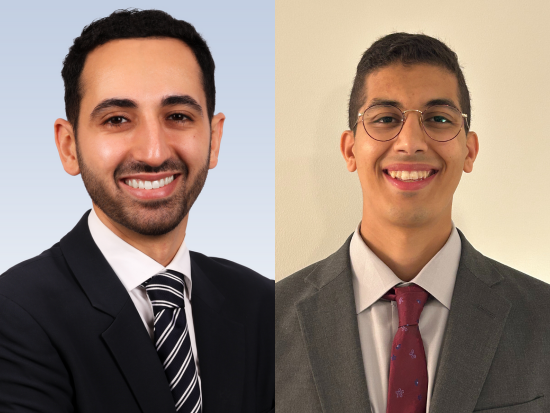Albert Schweitzer Fellows Faris Zaibaq, an M.D./Ph.D candidate at the Heersink School of Medicine, and Ethan Madison, DDS, a periodontology resident at UAB Hospital, recently led an urbanization project called “The Road Diet.” On July 26, 2024, a team of city workers and volunteers redesigned 1st Avenue South in Woodlawn to include all-way stop signs, pedestrian crosswalks, a two-way bike lane, and on-street parking as a way to invest in public health by improving the built environment.  Ethan Madison, DDS, Periodontology Resident and Faris Zaibaq, M.D./Ph.D candidate
Ethan Madison, DDS, Periodontology Resident and Faris Zaibaq, M.D./Ph.D candidate
“People who live and work in the Woodlawn area previously could not safely walk around their neighborhood. Several people had been killed, severely injured, or otherwise involved in crashes, including pedestrians and motorists, in the past few months along the stretch of road we improved,” said Madison. “We hope our improvements will reduce these preventable morbidities and mortalities.”
In conjunction with the Albert Schweitzer Fellowship of Alabama (ASFA), the Birmingham Department of Transportation, REV Birmingham, the Alabama Urbanists Coalition, the Woodlawn Neighborhood Association, and student volunteers from the Heersink School of Medicine, Zaibaq and Madison transformed 1st Avenue South into a safer street that serves the neighborhood's residents while also accommodating commuters traveling to and from Birmingham. Faris and Ethan collaborated with the HSOM Senate Service Board to recruit new first-year medical students to do the physical labor needed to execute the plan during medical student orientation service day.
 A team of city workers and volunteers redesigning 1st Avenue South in Woodlawn“This unique and practical Schweitzer Fellow project is a fantastic way for medical students to make a tangible and long-lasting contribution to the city of Birmingham, and we are so grateful to Ethan and Faris,” said Caroline Harada, M.D., associate dean for Strategic Initiatives in the Heersink School of Medicine Department of Medical Education. It was wonderful to see them involve the incoming medical students during orientation service day. What a great way for students to truly experience the city where they will learn medicine!”
A team of city workers and volunteers redesigning 1st Avenue South in Woodlawn“This unique and practical Schweitzer Fellow project is a fantastic way for medical students to make a tangible and long-lasting contribution to the city of Birmingham, and we are so grateful to Ethan and Faris,” said Caroline Harada, M.D., associate dean for Strategic Initiatives in the Heersink School of Medicine Department of Medical Education. It was wonderful to see them involve the incoming medical students during orientation service day. What a great way for students to truly experience the city where they will learn medicine!”
Zaibaq highlighted an issue at one of the intersections, where Faush Manor, an elderly care home, is across the street from Christ Health Center's clinic. Despite the clinic being about 100 feet away, residents are unable to cross the street safely due to the lack of a crosswalk, leading to significant accessibility concerns. Enhancing access for pedestrians and cyclists is expected to improve overall health in the area.
With that in mind, Zaibaq and Madison are not done yet. They are planning two more projects in Birmingham to improve Birmingham's urban landscape. They hope that their projects will be the beginning of more extensive urbanization plans for the city.
Faris mentioned that this project differs from what ASFA typically undertakes and expressed gratitude for their willingness to embrace something new by bringing them on as fellows. They seek to explore a significant issue from a fresh perspective.
“The Albert Schweitzer Fellowship provides a structured system in which we can more easily pursue our project goals with the support of peers and mentors,” said Madison.